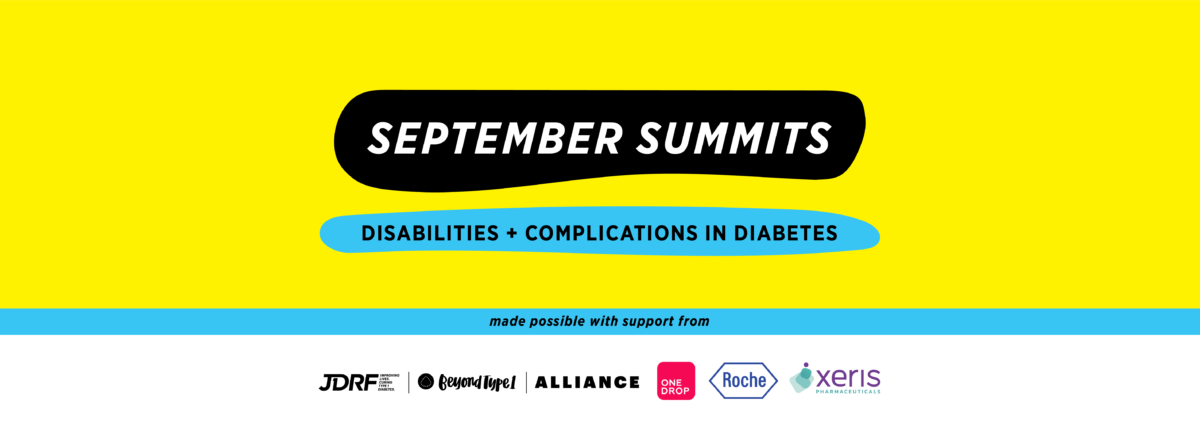Disabilities + Complications in Diabetes
September Summits are presented by the JDRF-Beyond Type 1 Alliance and made possible with support from One Drop, Roche Diabetes Care, and Xeris Pharmaceuticals, active partners of Beyond Type 1 at the time of publication.
During September Summits, Beyond Type 1 sat down with a panel of experts and community members to discuss collective perceptions of disabilities and complications, language surrounding these complexities and tips for conversations with healthcare providers.
Speakers included:
- Kerri Sparling, who served as the moderator for this event, has had type 1 for 34 years. She authored diabetes blog Six Until Me and is currently the editorial director at Children with Diabetes.
- Dan, who has had type 1 diabetes (T1D) for 24 years, lives just outside of London, UK and has his own podcast, Talking Type 1.
- Gisela Ayala, who has lived with T1D for 28 years ago, lives in Mexico City, and works for the Mexican Diabetes Federation.
- Sean Oser, who has lived with T1D for 31 years, works as a family physician in Denver, CO, and at the University of Colorado School of Medicine.
- Steve Edelman, who has lived with T1D for 50+ years, has worked at UCSD, and also started nonprofit organization Taking Control of Your Diabetes.
Partial transcript below, edited for content + clarity.
Do you consider diabetes to be a disability?
Gisela: In Mexico, diabetes is not considered a disability. But this is a controversial topic in the type 1 community in my country. There are two sides… A disability could mean marginalization. On the other hand, a disability is an impairment in a person’s body structure or function. People with type 1 cannot produce insulin and we need to receive complete treatment, training from our healthcare providers, et cetera, to enjoy the same opportunities as others. There are people who think we need to recognize T1D as a disability.
Dan: Personally, I don’t view type 1 as a disability. But I’m aware that it is a disability, if that makes sense. Kind of as Gisela said, our bodies aren’t functioning in the way that we need them to function, and we need to step in and do part of that work. But at the same time, I believe that I can still do what I want to do. However, over here in the UK, in terms of employment law, type 1 is considered a disability. It was covered under the Disability Discrimination Act, and most recently, in 2010, that changed to the Equality Act.
What that means is that if you’ve got a protected characteristic under that act, then you are covered by the law. An example of that law in practice is that your employer has to make reasonable adjustments for you if you have a condition under that act. In that sense in the eyes of the law, yes, it is a disability.
Steve: Kind of like Dan, I don’t consider it a disability. A good friend of mine with diabetes said, “I don’t think it’s a disability. But when my blood sugar is really low, I’m disabled.” In general, I’m a little more hardcore about it because I take care of college kids with type 1 and they’re really pushing it down the college’s throat, they get tons of extra time for the exam. I do think some people take advantage of it and that bugs me.
I don’t think it’s a disability, but you can be disabled. [To me,] if someone, let’s say has a foot amputation from diabetes, that’s disabled. If someone has bad heart disease, and really can’t be that active, that’s disabled, if you’re on kidney dialysis where you’ve got to go in three to four times a week, there have to be some adjustments. It’s an individual response. All of us have done the best we can, we got good attitudes. We’re here to share our stories, but not everybody is like us.
Do you talk about complications with your communities and with your friends?
Steve: If someone’s ever told you that they have cancer or they have something serious, for a lot of us, you don’t know what to say. You say, “I’m so sorry to hear that.” But it doesn’t go much further than that. I think it makes people feel uncomfortable. Even as my blood sugar goes up, and you hear my little beep, I find that people don’t really want to talk about it in detail. I don’t really shove it on anybody, even my girlfriend.
I came back from a walk and I do have kind of on and off painful neuropathy in my feet. I realized I was tying my shoes too tight. FYI, if you have neuropathy, people tie their shoes too tight because you don’t feel it, then you’ve cut off the circulation. I come back and I don’t say anything. I just don’t think people feel that comfortable listening to that.
Gisela: I think it’s difficult to say in our community, because if you said, “I have retinopathy or nephropathy,” some people would immediately react and think, “Okay, you failed.” As if you had broken some kind of promise with the group because you didn’t control your diabetes. Sometimes complications happen in your life and it’s time to talk about them. We make a lot of decisions with our complications, and we need support. We don’t need judgment, just support.
Sean: It completely depends on the community that you’re talking to. When we get groups of people like this together to talk, I feel completely comfortable talking about it. It’s extremely productive, it’s healing and hopeful. It’s not depressing. It’s nice to share. One of the single most powerful messages I took away from first becoming involved in the online diabetes communities was seeing the strength. I’m not alone, and other people feel like I do, and I can read what other people say. I realized that I’m not the only person experiencing that, and I feel the same way talking about these things.
But in a different kind of community where I might be the only one with diabetes, that’s very different. It might feel like there’s maybe less listening. There’s certainly less ability to understand, which is not their fault, but they haven’t walked in our shoes. There’s also a feeling of being tired and weary, “I don’t want to have to do all the backstory and explaining to.” It takes a bigger lift for me to do that.
Dan: For me, talking about retinopathy and having a kidney transplant within the diabetes online community is a safe space. I’d already received a transplant, so I had been through five years up until that point before I was active in the community. When I was talking more in the community, I noticed that these conversations about complications weren’t happening. I know that when I was diagnosed with complications there was a stigma. I felt like I had failed a test, I felt alone.
And I was thinking, “Well, if I’m feeling that way, I’m sure other people must be feeling that way.” When I have spoken about my complications, I felt quite vulnerable because I’m not quite sure how they were going to be taken. But at the same time, it was something that was important and needed to be said. People have reached out afterward and said, “I’m going through this, what was your experience?” I think it does take these conversations to happen so people realize they’re not alone. There should be no shame or stigma.
Steve: I love that story because that’s one of my big fears. The retinopathy can do stuff. I’ve had the injections, I’ve had the laser and the same kind of damage in the back of the eye occurs in the kidney, but we don’t have laser for the kidney. I have a preconceived notion of what it’s like. It does say it keeps you alive, but that’s something for me that I personally fear, is kidney failure.
Jeremy Pettis, Kerri, and my friend with type 1 encouraged me to write an article about my retinopathy and I got tons of great feedback. Just like Dan said, I think people really appreciate it. I realized that I could be helping others come out of the closet too because I think it’s how you frame it. I could go through this big laundry list, ‘See, all these are all my complications’ and I could say that after the whole thing, ‘Listen, I have a good attitude about it. I have access to good doctors, I do the best I can, and I’m here to talk about it.’
What kind of discussions are you having about complications with your providers?
Dan: I was diagnosed when I was 10 so going through my teenage years and early 20s, it was very much a fear-based conversation. It was scare-tactics, “You don’t want this to happen. You know what will happen if you don’t look after yourself.” During that time, I was dealing with diabetes, distress and diabetes burnout so hearing that it didn’t motivate me, it did the opposite. When I was dealing with the complication, I was also dealing with the stigma. I felt guilty. I felt a lot of, “If only you did this, and if only you did that.” It took time to change that self-talk, and actually forgive myself because I was doing the best I could at that time.
I’m in a completely different place now. I can’t change it. I can only live and learn from it. Recently, particularly with my retinopathy, I’ve tried to change how I talk to myself. The treatment that I’m getting is to improve my sight, rather than thinking it’s to save my sight. That little switch has just helped me to think, “Okay, well, I’ve got my sight, I’m trying to improve it rather than save it.” And take that fear away.
Sean: Kerri and I have been part of a couple of complications discussions where you can tell at the beginning people were nervous; the ones who didn’t have complications were very fearful of ever developing them. We’re very fearful of what those people who have complications would look like.
Then someone pretty much without fail, would get up and say, “I have this and this and this and this and this complication, and I’m doing okay.” They’re living their life, they’re being productive, they’re contributing to society, they’re having fun, they’re doing meaningful things. You could sense in so many of the other people a shift of the perspective maybe not from saving, but to living life and that what had always been looked at before as a failure and as an endpoint was maybe just another new thing. Another beginning, maybe not one that anybody particularly wants, but still life goes on and life can be wonderful.
Gisela: There is a thin line between realities and fear. I think people with diabetes need to know all the symptoms, the causes, the possible treatments and to be prepared to identify and face the possibility of complications. Of course, wishing not to have them but we still need to be prepared. I think preparation is very powerful. I think being prepared is always better than ignoring the possibilities. But sometimes doctors confuse motivation by giving you a big scare. I know in a lot of us in which fear has the opposite effect. You close your eyes and run away. when you’re scared. It’s not the best way.
To watch the entire discussion, click here.





